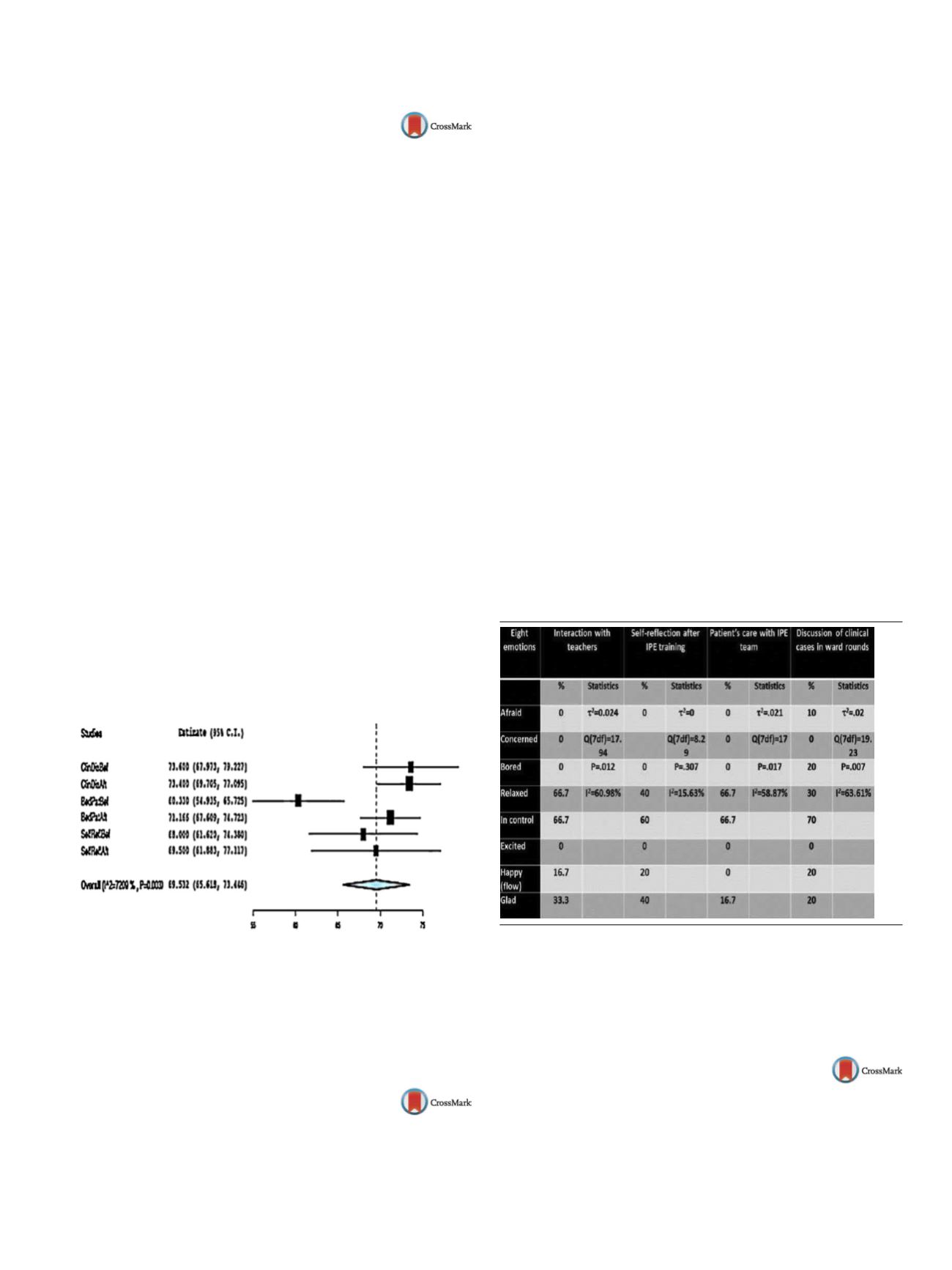

25th European Congress of Psychiatry / European Psychiatry 41S (2017) S847–S910
S897
EV1499
Ecological momentary assessment
and physiological self-evaluation
improve mindfulness of stress-related
events during interprofessional
training. Meta-analysis of a pilot study
C. Lazzari
1 , 2 ,∗
, I. Masiello
31
North Essex NHS University Foundation Trust, United Kingdom
2
General Adult Psychiatry, Pescara, Italy
3
Department of Clinical Science and Education, Karolinska Institutet,
Södersjukhuset, Clinical Education Centre, Stockholm, Sweden
∗
Corresponding author.
Introduction
Self-reflective learning improves interprofessional
education (IPE).
Objectives
Promoting ecological momentary assessment (EMA)
of IPE via an online app. This shall allowcontextual recording of stu-
dents’ heart rate during and after pivotal moments of their training,
thus improving mindfulness of stressful events (MSE).
Aims
To make health care students mindful of the effect of their
anxiety about learning, patient safety and performance.
Methods
Thirty-two undergraduate students contextually
recorded their heart rate with a pulse-oximeter before and after
each learning moment: discussion of a clinical case during ward
rounds (ClinDis), attending patients as an interprofessional team
(BedPat) and self-reflective practice at the end of each day of train-
ing (SelfRef). Results were recorded on a dedicated app linked to
an online survey. Meta-analysis with Tau squared (t
2
), Cochrane’s
Q and I
2
provided the results.
Results
Meta-analysis
( Fig. 1 )of IPE events was significant at
P
= 0.003, with t
2
= 16.515, Q (5d.f.) = 17.913, and I
2
= 72.088%. The
bedside care had the higher statistically significant heterogeneity in
the before-after event with t
2
= 53.275,
P
= 0.001, Q (5d.f.) = 10.803
and I
2
= 90.74% due to an increase in heart rate after patient care
(BedPatAft).
Conclusions
EMA reinforces self-reflection in IPE by making stu-
dents mindful of the impact of educational emotions on team
performance and patients’ quality of care.
Fig. 1
Results for contextual heart rate during interprofessional
education.
Disclosure of interest
The authors have not supplied their decla-
ration of competing interest.
http://dx.doi.org/10.1016/j.eurpsy.2017.01.1829EV1500
Flow experiences improve
mindfulness of educational emotions
during interprofessional training.
Meta-analysis of a pilot study
C. Lazzari
1 , 2 ,∗
, I. Masiello
31
North Essex NHS University Foundation Trust, United Kingdom
2
General Adult Psychiatry, Pescara, Italy
3
Department of Clinical Science and Education, Karolinska Institutet,
Södersjukhuset, Clinical Education Entre, Stockholm, Sweden
∗
Corresponding author.
Introduction
Csikszentmihalyi defines “flow experience” as the
state of mind students experience when the average skills and
challenges while learning are above their own average.
Objectives
Delle Fave, Massimi, & Bassi optimal experiences are
used to assess students’ flow experience during interprofessional
education (IPE).
Aims
To use the emotions comprising the Milan school eight-
channel model [“afraid, concerned, bored, relaxed, in control,
excited, happy (‘flow’), and glad”] to assess flow experiences of
undergraduate health care students during interprofessional train-
ing.
Methods
Twenty-seven undergraduate health care students
undergoing IPE training recoded their flow emotions during
discussion of a clinical case in ward rounds, patient care in inter-
professional teams, self-reflective practice at the end of each day
of training and supervision of teachers. Statistical evaluation using
meta-analysis with Tau squared (t
2
), Cochrane’s Q and I
2
provided
the results
( Table 1 ).Results
As reported in
Table 1 ,interactions with teachers
(I
2
= 60.98%), patient care (I
2
= 58.87%) and discussion of clinical
cases (I
2
= 63.31%) reported higher variability, significant at
P
< 0.05.
Themost frequent emotionswere “relaxed” (> 66%) and “in control”
(> 66%) but not “flow” (> 20%).
Conclusions
Results show that challenges were below the skills
possessed, which can slow down the learning process.
Table 1
Results for flow experiences in interprofessional
education.
Disclosure of interest
The authors have not supplied their decla-
ration of competing interest.
http://dx.doi.org/10.1016/j.eurpsy.2017.01.1830EV1501
Doctor–patient communication issues
for international medical graduates
and medical graduates of foreign
origin in Ireland
C. Maddock
∗
, F. Kelly
Louth Meath Mental Health Service, Health Service Executive Ireland,
Psychiatry, Dublin, Ireland
∗
Corresponding author.


















